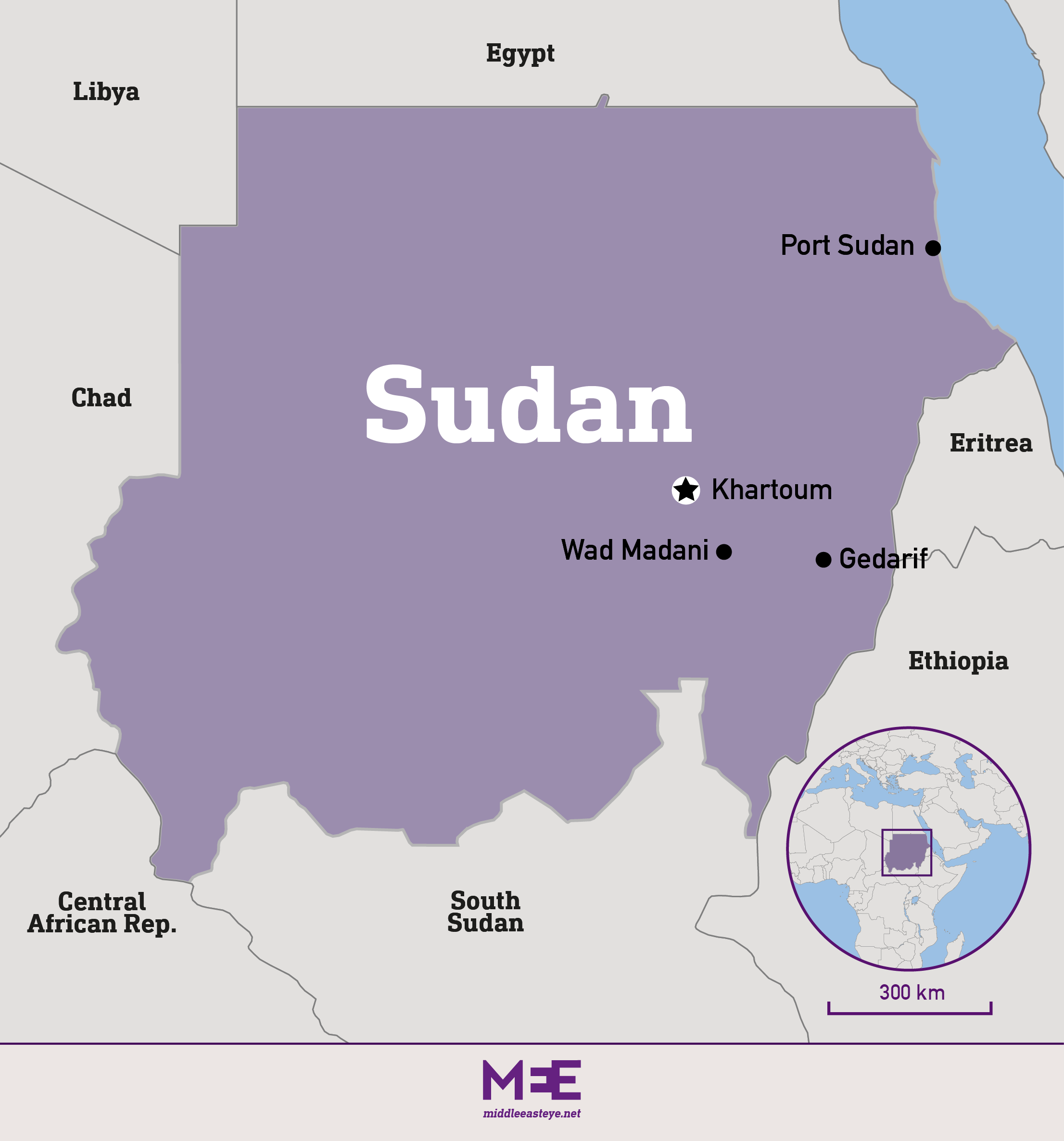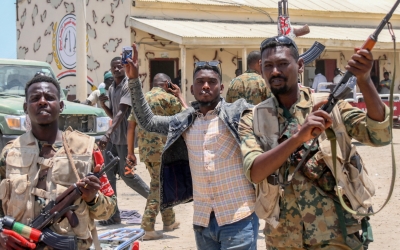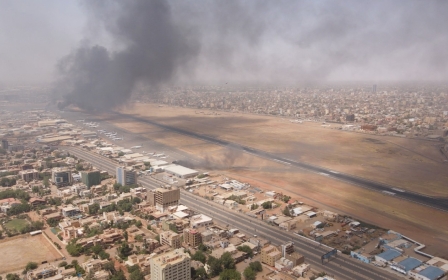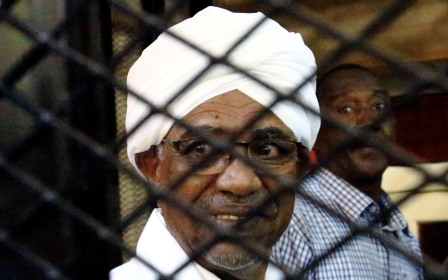Sudan turmoil: Khartoum exodus as residents seek escape from fighting
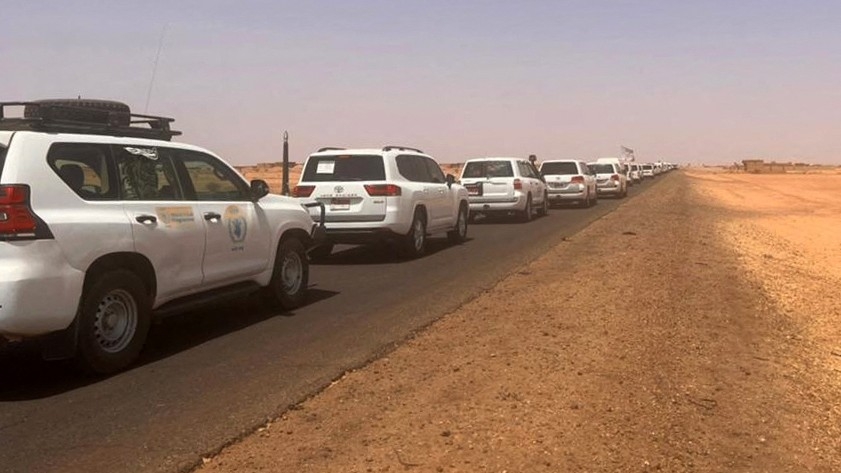
On Friday morning at 10.30 am, Hind Fadul left her home in Khartoum, the capital of Sudan, and got on a bus to go to Wad Madani, in Al Jazirah state in the eastern-central part of the country.
Ordinarily, the journey would take between two and three hours.
But this is a time of war, and an hour after Fadul set off with ten other passengers, the bus drove into a battle between the Sudanese Armed Forces (SAF) and the paramilitary Rapid Support Forces (RSF), which have been fighting each other for more than a week.
Fadul was in a Khartoum city bus, not the usual type of bus that leaves the capital to take passengers out into the provinces.
The ticket cost around $50 per person, a price that had doubled in a day and which is now even higher.
“The usual road from Khartoum to Wad Madani is two to three hours. I got there in around eight hours. It was a very hard journey,” Fadul told Middle East Eye.
She said that while they were still in Khartoum, a convoy of RSF vehicles had been on their tail before passing them by. The bus then encountered the RSF group further along the road, as they drove into the battle between the militia fighters and the SAF.
'It was really hard and terrifying leaving home but maybe staying in Khartoum was more risky'
- Hind Fadul, Khartoum resident
“Once we got onto the Soba road, which takes you to Wad Madani from Khartoum, there was a fight between the RSF and the SAF near a place called Giad. We had to get off the main road as quickly as possible and try to find a way through the desert, along bad tracks and across the sand,” Fadul said.
“It took us forever. We couldn’t get back onto the road again because we could hear the bombing and see the smoke from far away. The driver was scared that the battle would reach us, so we went very deep into the desert and at some point we got lost and didn’t know where we were.
"For two hours we were driving without anyone around us until we finally hit another road, where we could ask for directions.”
Fadul said that on the way into Wad Madani, where life is relatively normal, they saw one SAF vehicle, which waved them through.
Exodus
Stories of escape are becoming more common, as the residents of Khartoum and its twin city, Omdurman, who number over five million, find themselves caught in the middle of the ongoing power struggle between the army and the RSF, the country's biggest paramilitary.
Historically, Sudan's capital has been spared the bloodshed inflicted by state actors. This time, things are different, and Khartoum's residents are desperately fleeing what has become the raging centre of deadly fighting, as at least 400 people have died since open conflict broke out between the two military entities.
While the eyes of the world are focused mainly on those foreign civilians being evacuated to their home countries, Sudanese are heading by road to places like Wad Madani, Port Sudan on the Red Sea coast, and Gedarif, near the Ethiopian border in the east of the country.
They are heading into rural areas of Al Jazirah state and going north in their thousands to the border with Egypt.
Local media has reported that more than 10,000 people have crossed the border into South Sudan, while 10,000-20,000 are said to have fled into neighbouring Chad, which shares a 1,500km border with Sudan.
“Approximately 10,000 and 20,000 people have arrived in Chad fleeing the conflict in Sudan,” a spokesperson for the United Nations refugee agency (UNHCR) told Middle East Eye.
“The majority of the new arrivals are women and children, who have had to flee with only what they could carry and are now sheltering in the open.”
The spokesperson added that 2,172 South Sudanese nationals living in Sudan had returned as of Saturday night.
“The majority are arriving at the Renk border crossing point in Upper Nile State. UNHCR is reinforcing presence at the border and sending relief items for the most vulnerable,” the agency said.
North to Egypt
Egypt, Sudan's largest and most influential neighbour, shares a 1,200km border and is a natural destination for many fleeing Khartoum.
One Sudanese family told MEE they had arrived safely in Cairo via Argeen, a town on Lake Nasser on the Egyptian-Sudanese border. They said they had rented a bus from a company called Arjun Transport for $5,000, a price that has since more than doubled.
It took the group 12 hours to get to the border crossing, from where they then went on to Cairo via Aswan, in southern Egypt. They said the border crossing was open and that they had not been interrogated because “we were riding a tourist bus and not a small car, and we were a family all together”.
Noon, a Khartoum-based social media user, documented her family’s journey to Egypt in a detailed Twitter thread on Sunday.
She said that she boarded one of many buses, which carry up to 50 passengers, at a price of $66. That cost has since gone up to around $400 as of Monday, according to an MEE correspondent in Sudan.
Noon documented boarding a bus from the central city of Soba to the bus station in Omdurman, during which her party was confronted by both RSF and army checkpoints.
She said both checks were quick due to the presence of children and elderly people.
From there, she travelled to Dongola in northern Sudan, and onto the Argeen on the Egyptian border.
“All women, children, and men over 50 of Sudanese nationality will be let in with no issue. However, men between 16-49 will not be let in without a visa,” said Noon, who added that the men in her group travelled to Wadi Halfa on the border to get visas issued at the Egyptian consulate.
MEE was told by other sources trying to make the journey that Sudanese men aged 16-49 could only enter Egypt if they have an entry visa, though there were reports of this being waived on Monday.
Facebook posts seen by MEE detailing the journey to Egypt stated that the consulate in Wadi Halfa was closed for three days for Eid, and therefore no visas had been issued for men before Sunday.
Several people on social media noted that only those with a residency permit for a Gulf country had been able to obtain visas for $25.
An 11-point list of documents needed to cross the border into Egypt has also circulated on Sudanese WhatsApp groups, with travellers advised to take photographs of their passports, birth certificates, driving licenses, bank account numbers, houses, and other documentation in order to ease their progress.
Once over the border, several Sudanese have reported on social media that they travelled to Cairo via Aswan, either via sleeper trains, on local flights, or on a bus.
To leave or stay
The question of whether or not to leave Khartoum has weighed heavily on the minds of many residents. Some have stayed where they are. Some have merely moved to quieter suburbs where the fighting is less intense.
One resident who made the journey to Port Sudan - over 800km by road from Khartoum - described being greeted at every town along the way with "kinkade" (hibiscus juice) and cold water brought out for "Khartoum travellers".
“Humbling experience 'cause they don’t have much but were offering plenty. Why would I leave this?” she asked. The journey took her "nearly 24 hours" via the "longer but safer route", she said.
Similarly, Kholood Khair, a Sudanese political analyst, tweeted that she had taken almost 24 hours to reach Port Sudan from Khartoum. She noted "lots of SAF presence - some on a PR drive", as well as "RSF presence on Garri Road", northeast of Khartoum.
Khair said the decision to leave the capital had been an "excruciating" one. "Can't help but wonder at both the unfamiliarly empty streets yet constancy of the Nile and think: when will I return?"
One piece of advice being circulated on WhatsApp to Sudanese citizens fleeing the capital reads: “Don’t get preoccupied with your belongings that aren’t important like clothes and things like that because it will be an extra weight for you and you will be able to replace them, God willing.”
The economic and food security situation is deteriorating rapidly. The Sayga Food Industries factory in Khartoum, one of biggest and most important producers of flour, sugar, rice, and many other foodstuffs, was destroyed yesterday.
There is a lack of water and groceries and what is still available is very expensive. People are filling water up in barrels wherever they can find it.
"Right now the situation of food and filtered water is a huge problem. At some point, if people don’t die from the bombing and the bullets they will die from hunger if this situation doesn’t get fixed," Fadul told MEE.
“It was really hard and terrifying leaving home but maybe staying in Khartoum was more risky,” she said.
“Everyone is trying to leave and they regret not leaving. RSF forces have started entering houses. It’s scarier. The cost is very high. There is no cash. The banks are closed and the Bankak app is not working, the internet is not working.”
Middle East Eye propose une couverture et une analyse indépendantes et incomparables du Moyen-Orient, de l’Afrique du Nord et d’autres régions du monde. Pour en savoir plus sur la reprise de ce contenu et les frais qui s’appliquent, veuillez remplir ce formulaire [en anglais]. Pour en savoir plus sur MEE, cliquez ici [en anglais].


